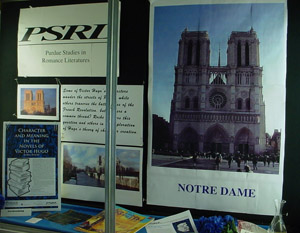Character and Meaning in the Novels of Victor Hugo
Isabel Roche
Victor Hugo’s lasting appeal as a novelist can be attributed in large part to the unforgettable characters that he created, yet the most criticized and least understood element of his fiction has been character. Isabel Roche’s Character and Meaning in the Novels of Victor Hugo seeks to unravel this paradox through a comprehensive re-evaluation of the creation and role of character in Hugo’s five major novels: Notre-Dame de Paris (1831), Les Misérables (1862), Les Travailleurs de la mer (1866), L’Homme qui rit (1869), and Quatrevingt-treize (1873).
With an approach that combines attention to genre, narratology, and reader-response criticism, as well as consideration of Hugo’s own critical and philosophical writings, Roche explores the ways in which Hugo’s novels eschew the realist notion of the representable individual in favor of a new—and surprisingly modern—kind of fiction in which character serves a conceptual, nonpsychological function. Character and Meaning in the Novels of Victor Hugo provides a deeper understanding of the complexities and nuances that characterize both Hugo’s novel writing and the nineteenth-century French novel, and will thus appeal to the specialist and nonspecialist alike.
“[Roche's book] will make an important contribution to Hugo studies and, more broadly, to our understanding of nineteenth-century French fiction. The author has addressed a critical question that earlier scholarship had failed to ask: why does Hugo develop character as he does?” Kathryn M. Grossman, author ofThe Early Novels of Victor Hugo and Figuring Transcendence in “Les Misérables”
“Larger than life by design—not by flaw—Hugo’s characters provide readers, as this study elucidates, with fertile ground for inquiry into larger and essential questions about character-making in nineteenth-century French fiction and about the ways in which character generates meaning. Character and Meaning in the Novels of Victor Hugo provides a deeper and more comprehensive understanding of the complexities and nuances that characterize both Hugo‘s novel writing and the nineteenth-century French novel, and will thus appeal to specialists and nonspecialists alike.”SirReadaLot.org/issues No. 96 (March 2007). Available online at <http://www.sirreadalot.org/SRL/reviews/0096.htm#Roche>
"Isabel Roche sets out to complement the wealth of renewed scholarly interest in Hugo since the 1950s by re-evaluating his use of character against fresh criteria other than verisimilitude. … For both Hugolatres and scholars of post-Revolutionary France, this is indeed a highly engaging and impressively thorough study that respects not only the timeless appeal of characters such as Quasimodo and Jean Valjean, but also the tensions and oppositions inherent in their stories." Bradley Stephens, Modern Language Review 103.2 (April 2008): 543.
"L'ouvrage d'Isabel Roche montre bien, au total, que les reproches visant la création des personnages, chez Hugo, ignorent les conceptions romanesques particulières de l'auteur des Misérables; c'est de propos délibéré que celui-ci a fait figurer dans ses romans des protagonistes qui ont dépouillé toute individualité singulière pour représenter une idée." Michel Brix, Nineteenth-Century French Studies 35.384 (Spring/Summer 2007): 680-82.
For further reviews, see:
The Chronicle of Higher Education 26 Jan. 2007.
Reference and Research Book News May 2007.
Isabel Roche, Bennington College, specializes in the nineteenth-century French novel. She has published articles on Hugo’s Notre-Dame de Paris and Les Misérables.
ISBN-10: 1-55753-438-1; ISBN-13: 978- 1-55753-438-5
2007. Vol. 38. x, 242 pp. Paper $43.95

Display in Stanley Coulter Hall, September 18-25, 2006.